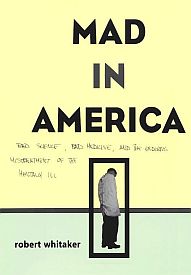Mad In America:
Bad Science, Bad Medicine,
and the Enduring Mistreatment of the Mentally Ill

Journalist Robert Whitaker's articles on the mentally ill and the drug industry have won several awards, including the George Polk Award for medical writing and the National Association of Science Writers' Award for best magazine article. He was named a finalist for the Pulitzer Prize for a Boston Globe series on harmful research involving the mentally ill that he co-wrote in 1998 -- a series which led him to write Mad in America: Bad Science, Bad Medicine, and the Enduring Mistreatment of the Mentally Ill (Perseus Publishing, 2002). Whitaker lives in Cambridge, Massachusetts.
"American psychiatry has excelled throughout the nation's history, but doctors and drug manufacturers have profited far more than psychiatric patients. When the World Health Organization compared schizophrenics' recovery rates in the U.S and in nations too poor to afford the latest psycho-pharmaceuticals, it found that a Third World patient was exponentially likelier than an American one to regain sanity. Whitaker's articulate dissection of "mad medicine" in the U.S. explains why that dismaying contrast obtains. Assuming that insanity arises from identifiable physical causes, American psychiatry theorized about those causes and sought to find physical therapies and, later, drugs that attacked those causes. Accordingly, from being shocked with cold water and repeatedly nearly drowned, to suffering chemically and electronically induced grand mal seizures, to having the frontal lobes of their brains chopped off, to being drugged into parkinsonism (the preferred modus nowadays), the mad in America have suffered as essentially nonconsensual experimental subjects. Since World War II, drug companies have made continued testing increasingly worthwhile, despite the lack of encouraging results. This horrifying history is all the more discomfiting because another mode of treatment was successfully used from the late eighteenth century until the 1870s. Called moral treatment by its Quaker champions, it involved treating the mad with kindness and sympathetic companionship rather than drugs and machines. But it cost too much, and it wasn't professional."
-- Ray Olson, Booklist *Starred Review*
"Mad in America is a dose of truth therapy for a seriously disturbed mental health system. Whitaker uncovers the secret underside of the psychiatric establishment, and some of its most hazardous treatments. This courageous book made me want to stand up and cheer.
-- David Oaks, Director of Support Coalition International
"Investigative journalism at its scholarly, perceptive, and explanatory best. Mad in America presents an insightful, courageous expose of how madness went from 'out of sight, out of mind,' to be a source of massive corporate profits. A must read for anyone with a friend or family member labeled 'mentally ill,' for psychiatric 'survivors,' mental health professionals, and those interested in the history of science and the corporate buyout of a profession."
-- Loren Mosher, M.D. Former Chief of Schizophrenia Studies, National Institute of Mental Health
Bob Whitaker has an excellent website:
www.MadInAmerica.com.

There is an comprehensive
interview with Robert Whitaker that was published in the Street Spirit homeless newspaper.
Whitaker wrote a powerful and concise condemnation of forced drugging and outpatient commitment that appeared in the Boston Globe 6/9/2002. His article on drug company propaganda in Ron Howard's film "A Beautiful Mind" (John Nash has been off all psychiatric drugs since 1970!) appeared in USA Today 3/4/2002
Download the Boston Globe article "Forced Drugging is Inhumane" in PDF format. Read "Mind Drugs May Hinder Recovery" at the USA Today website. You can also read Whitaker's
A Plea for Honesty, from Adbusters magazine, in PDF format.
Whitaker also wrote
"The case against antipsychotic drugs: a 50-year record of doing more harm than good," an excellent summary that appeared in the scientific journal Medical Hypotheses Volume 62, Issue 1, January 2004. PDF format.
Last November Freedom Center was honored to host a visit by Robert Whitaker, who spoke at the Anchor House of Artists to a packed crowd of 80 people. We have a great
recording of Whitaker's powerful and inspiring talk available on 2 audio cds (playable in any regular music cd player). These broadcast-quality audio recordings were recorded and mastered by sound engineer
Aaron Piziali. The cd's are free; donations appreciated. Email Freedom Center for info.
You can also
download and listen to the cool radio announcement we made to promote the event (a 1.1 MB mp.3 file, about 4 min on a 56k modem).

